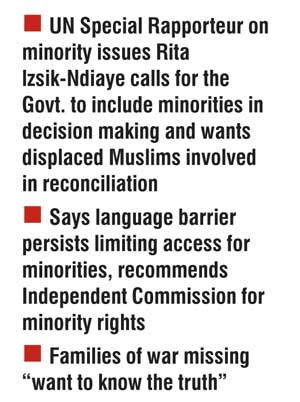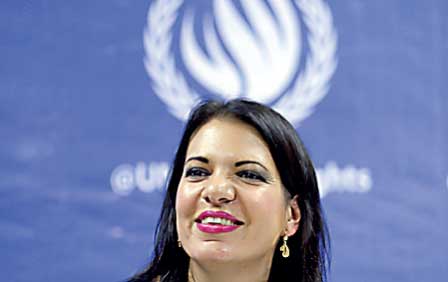Thursday Feb 19, 2026
Thursday Feb 19, 2026
Friday, 21 October 2016 00:01 - - {{hitsCtrl.values.hits}}
By Chathuri Dissanayake
Minority communities still feel excluded from the decision-making processes of the Government, said United Nations Special Rapporteur on Minority Issues Rita lzsik-Ndiaye in her evaluation yesterday, calling for the Government to build trust between  communities.
communities.
Presenting her findings while wrapping up a 10-day mission to the country, Izsik-Ndiaye raised concerns over the Muslim community affected by war being largely ignored in reconciliation efforts.
Addressing a media gathering at the United Nations Compound, she commended the efforts taken by the Government to have representations from all communities in Public Representations Committee on Constitutional Reform (PRC) and the Consultation Task Force on Reconciliation Mechanisms (CTF). However she highlighted minority communities still “feel excluded from other areas of decision-making and power structures”.
Concerns over land rights, security-related detainees and demilitarisation have infringed on minority rights, she said, calling upon the Government to take swift action on such matters to retain the confidence of community members.
Putting forward a number of recommendations to address these issues, Ndiaye stressed that implementing these would be “crucial to build the trust between the communities”.
“There is still optimism among the people, and there is a sense that things can change. There are a lot of moderate voices; many of the extreme voices have been ignored because there is not enough support for them. So there is generally positive environment, they feel that more should be done in the short term,” Ndiaye said.
An Independent Commission on Minorities under the Constitution with a clear mandate, which the rapporteur recommended should be established, would empower, give resources and autonomy with a mandate to monitor the situation of minorities and recommend strategies and policy changes to safeguard the their rights along with number of other key responsibilities concerning minority interests.
Ndiaye highlighted that the interests of the Muslim community who were affected by the war should also be addressed separately, highlighting that the resettlement numbers of the Muslim community who were displaced by war are at alarmingly low levels.
“It is also important to remember that, while the post-conflict issues in the Northern and Eastern parts of the country are often seen  as essentially problems between the Tamil and the Sinhalese, the Muslims, who were caught in between the two, and displaced in significant numbers, continue to suffer to this day. I must underscore the importance of recognising them as a separate minority group and give their specific circumstances and grievances full attention,” she said.
as essentially problems between the Tamil and the Sinhalese, the Muslims, who were caught in between the two, and displaced in significant numbers, continue to suffer to this day. I must underscore the importance of recognising them as a separate minority group and give their specific circumstances and grievances full attention,” she said.
Ndiaye also highlighted the urgent need to establish transparent processes through the Missing Persons’ Commission to help the families of missing to find out the fate of their loved ones.
“Women that I consulted with are not happy just getting a certificate, they need the truth,” she said.
Another key concern raised was the limited religious freedom experienced by the minority religious communities were also raised, with emphasis that “the protection and promotion of minority religious communities must be further safeguarded”.
Actions of extremist groups which incite violence and hatred against religious and other minorities should not be tolerated she highlighted, “particularly, in a society that is already significantly fragmented and is wishing to re-establish long-lasting peace and harmony, such aggression and extremism must not be allowed and tolerated. It is of utmost importance that, through effective prosecution of perpetrators, those who incite or perpetrate hatred and violence are not allowed to succeed in deepening divisions between communities.”